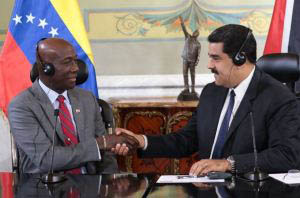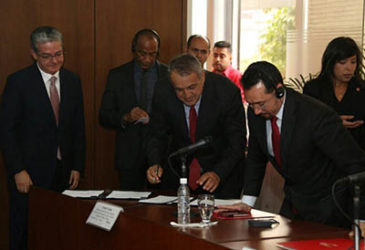Last week’s signing in Caracas of an agreement between Trinidad and Tobago and Venezuela, under which the former will receive natural gas from the huge Dragón Field, will not affect Guyana’s perception of the quality of its relationship with its sister Caricom country. Nor will it impact on what has been confirmed as an agreement between Georgetown and Port of Spain under which support will be forthcoming for the development of an oil and gas sector here.
This was the sentiment expressed by Natural Resources Minister Raphael Trotman to Stabroek Business earlier this week after the gas purchase deal between Trinidad and Tobago and Venezuela was signed on Tuesday March 14.
The announcement in 2015 that a protracted offshore search had finally turned up significant deposits of oil and gas has led to speculation that this might somehow reignite tensions between Guyana and Venezuela arising out of the latter’s more than century-old, illegal claim to two-thirds of Guyana’s territory. Contextually, the issue of what has been a track record of cooperation between Venezuela and Trinidad and Tobago had arisen here once it had been announced that Guyana would be receiving technical support from Trinidad and Tobago in its own quest to become an oil-producing nation. However, in a brief comment made in response to a question raised by this newspaper Trotman said that the purchase agreement between Trinidad and Tobago and Venezuela was “not a matter of concern for us at all.” Asserting the “sovereign states are expected to do what is best in their national interest” the Natural Resources Minister said that Guyana had “no difficulty” with the purchase agreement and that it “will not affect overall or specific relations with T&T…”

A report in the Trinidad Guardian on March 15 disclosed that the agreement between Trinidad and Tobago and Venezuela “deals with the construction, operation and maintenance of a gas pipeline that goes from the Dragón Field located in the north coast of the state of Sucre, in Venezuela, to the Hibiscus Field in Trinidad.” Late last year several agreements on oil and gas-related matters were signed between the two countries during a visit to Caracas by Prime Minister Keith Rowley.

In September last year it had been announced that Guyana and Trinidad and Tobago had agreed to the signing of an oil and gas support memorandum of understanding (MoU) and that the document was expected to be signed by November last year. Questions, however, have arisen over the delay in the signing of the memorandum which had occurred in the wake of a portfolio change that had seen the replacement of Trinidad and Tobago’s then Energy Minister Nicole Olivierre. Trotman had told the Stabroek Business late last year and again earlier this year that there had been a delay in concluding the MoU though, more recently, he had said that the way had now been cleared for pressing ahead with the agreement.
The agreement arises out of an offer made by Trinidad and Tobago to provide technical support to Guyana as the country seeks to develop an oil industry. In broad terms, the scope of the agreement reportedly covers education, focusing on engineering and technical studies, infrastructure development, and agriculture. There is still no information on when the MoU is likely to be signed.
Analysts both here in Guyana and abroad have continued to speculate on the likely future of relations between Guyana and Venezuela in the wake of Guyana’s oil find and particularly whether the prospect of Guyana becoming an oil-rich nation may not trigger the reoccurrence of the periodic sabre rattling by Venezuela.





